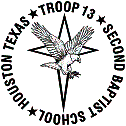
The Patrol Method
The Troop is made up of patrols, or working subunits of the troop. Each patrol elects its own boy leader, called a Patrol Leader, assisted by an Assistant Patrol Leader. Patrol Leaders must maintain a positive spirit with the members of the patrol.
By setting the example, Patrol Leaders should earn the respect of the members by being a solid role model. Each patrol helps its members develop a sense of pride and identity. The boys themselves elect their Patrol Leader, divide up the jobs to be done, and share in the satisfaction of accepting and fulfilling group responsibilities.
The ages and ranks of the scouts may vary within the regular troop patrol except for the new scout patrols. A separate patrol is made up of new scouts under the rank of Tenderfoot which continues through the summer camp. Each patrol has its own name, flag, yell, meetings, and sense of identity.
Each patrol consists of 8-10 Scouts, some of whom will be older, higher-ranking Scouts who will assist with training and Scout skills for the younger Patrol members. In addition, a Troop Guide is assigned as a mentor to the Patrol Leader and patrol. The patrol leader is responsible for organizing and leading all patrol activities. A troop guide, one of the older scouts, will be assigned to some patrols.
At Troop meetings, each patrol should be given time to have a patrol meeting in order to plan upcoming activities, campouts, and outings. On campouts, all patrol members help in setting up tents and patrol equipment, preparing and cooking meals, and cleanup. The patrols may also have separate activities outside the normally scheduled Troop events.
New Scout Patrol
Each new Scout joining the troop will be put into a new Scout Patrol, which allows them to observe and learn meeting and patrol activities. Special arrangements will be made for camping including attending the District Camporee in March.
Specific patrol positions and their associated qualifications, duties, and expectations are as follows:
Senior Patrol Leader
Qualifications
Must have served as an Assistant Senior Patrol Leader
Must be Life or Eagle Rank
Must lead all Troop meetings
Must attend and lead all campouts
Must attend and lead PLC meetings
Must attend Junior Leader Training course
Must follow all the rules set by the Troop as an example to the other Scouts
Duties
Plans meetings with Scoutmaster each week
Communicates instructions to ASPL’s for all Troop functions
Leads all fall-ins at Troop meetings and Campouts
Leads PLC meetings
Responsible for ASPL and PL duties
Performs strong role modeling to younger Scouts
Sets the example for all other Scouts to follow
Expectations
Must attend at least 90% of all Troop meetings and campouts
Must have a positive attitude with Scoutmaster
Must maintain a positive spirit with the Troop.
Must have shown through example that leadership skills are present and understood.
Must have shown through example the importance of being a strong role model.
Must be committed to the success of the Troop and personal leadership growth.
Assistant Senior Patrol Leader
Qualifications
Must have served as a Patrol Leader
Must be Star Rank
Must attend Troop meetings
Must attend campouts
Must attend PLC meetings
Must attend Junior Leader Training course
Must follow all the rules set by the Troop as an example to the other Scouts
Duties
Assists Senior Patrol Leader in all Troop functions
Assumes Senior Patrol Leader duties if SPL is absent
Teaches Patrol Leaders basic Leadership skills
Performs strong role modeling to younger Scouts
Sets the example for all other Scouts to follow
Expectations
Must attend at least 90% of all Troop meetings and campouts
Must maintain a positive spirit with the Troop and Senior Patrol Leader.
Must show respect to the SPL in carrying out assigned duties.
Must have shown through example that leadership skills are present and understood.
Must have shown through example the importance of being a strong role model.
Must be committed to the success of the Troop and personal leadership growth.
Patrol Leader
Qualifications
Must have served as an Assistant Patrol Leader
Must be First Class rank
Must attend Troop meetings
Must attend campouts
Must attend PLC meetings
Must attend Junior Leader Training course
Must follow all the rules set by the Troop as an example to the other Scouts
Duties
Leads Patrol in all patrol functions
Communicates all Troop plans to patrol members
Teaches Patrol members basic Scout skills
Assists Patrol members in certain advancement skills
Delegates duties to patrol members for campouts
Expectations
Patrol Leaders must maintain a positive spirit with the members of the patrol
By setting the example, Patrol Leaders should earn the respect of the members by being a solid role model
Must maintain a positive spirit with the Troop and SPL
Must show respect to the SPL and ASPL’s in carrying out assigned duties
Must have shown through example that leadership skills are present and understood
Must have shown through example the importance of being a strong role model

